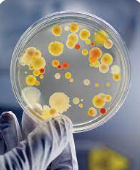Clinical Diagnostic Immunology in A Clinical Microbiology Laboratory
DOI:
https://doi.org/10.23958/mcha/vol01/i05/28Abstract
This review unravels the novel approaches, innovations and applications of immunology in the diagnosis of infections in a clinical microbiology laboratory. Many assays or tests in immunology are used in the diagnosis of infections. The availability of monoclonal antibodies has brought rapid progress to this area and they are used , for example , to identify specific microorganisms in culture or in tissues and fluids from infected patients.
Examples of common diagnostic applications of antibody- antigen reactions discussed here includes agglutination tests, complement tests, complement fixation tests, ELISA, cytotoxic tests, radioimmunoassay tests, haemagglutination inhibition tests, hypersensitivity tests, phagocytic cell activity test, migration inhibition test, lymphocyte transformation test , lymphocyte fixation test , skin tests, delayed hypersensitivity tests and many others.
The development of monoclonal antibody technology and the subsequent availability of unlimited quantities of pure antibody has improved the selectivity of these assays. The development of simple and highly sensitive methods for detection of nucleic acids is being applied to diagnosis of infection using nucleic acid hybridization and this provides a valuable additional aid to immunoassays in the clinical microbiology diagnostic laboratory.
Downloads

Downloads
Published
Issue
Section
License
Copyright (c) 2023 Philip Ifesinachi Anochie (Author)

This work is licensed under a Creative Commons Attribution 4.0 International License.
Creative Commons License All articles published in Medicine & Community Health Archives are licensed under a Creative Commons Attribution 4.0 International License.



